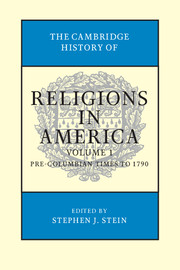Book contents
- Frontmatter
- Contents
- Contributors
- Editor's Introduction
- SECTION I BACKGROUND ON RELIGIOUS TRADITIONS – PRE-1500S
- 1 Native American Religion
- 2 Roman Catholicism circa 1500
- 3 Protestant Traditions in Western Europe on the Eve of North American Colonization
- 4 Religious Traditions in Great Britain on the Eve of Colonization
- 5 Some Notes on African Religious Traditions from the Fourteenth Century Onward
- SECTION II RELIGIONS IN THE POST-COLUMBIAN NEW WORLD – 1500–1680S
- SECTION III RELIGIOUS PATTERNS IN COLONIAL AMERICA – 1680S–1730S
- SECTION IV RELIGIOUS DIVERSITY IN BRITISH AMERICA – 1730S–1790
- SECTION V AMERICAN RELIGIONS IN THE EIGHTEENTH-CENTURY INTERNATIONAL CONTEXT
- SECTION VI THEMATIC ESSAYS
- Index
- References
4 - Religious Traditions in Great Britain on the Eve of Colonization
from SECTION I - BACKGROUND ON RELIGIOUS TRADITIONS – PRE-1500S
Published online by Cambridge University Press: 28 July 2012
- Frontmatter
- Contents
- Contributors
- Editor's Introduction
- SECTION I BACKGROUND ON RELIGIOUS TRADITIONS – PRE-1500S
- 1 Native American Religion
- 2 Roman Catholicism circa 1500
- 3 Protestant Traditions in Western Europe on the Eve of North American Colonization
- 4 Religious Traditions in Great Britain on the Eve of Colonization
- 5 Some Notes on African Religious Traditions from the Fourteenth Century Onward
- SECTION II RELIGIONS IN THE POST-COLUMBIAN NEW WORLD – 1500–1680S
- SECTION III RELIGIOUS PATTERNS IN COLONIAL AMERICA – 1680S–1730S
- SECTION IV RELIGIOUS DIVERSITY IN BRITISH AMERICA – 1730S–1790
- SECTION V AMERICAN RELIGIONS IN THE EIGHTEENTH-CENTURY INTERNATIONAL CONTEXT
- SECTION VI THEMATIC ESSAYS
- Index
- References
Summary
In a period as actually or potentially unstable as the post-Reformation era, it would probably be a serious (albeit common enough) mistake to speak of religious traditions as though they were stable and unproblematic features of the religious, cultural, and political scene. Rather we should think of the period as one in which various traditions were under construction and reconstruction, as a number of different groups and factions sought both to accommodate themselves to and to shape the course of events. On both sides of what by the latter part of the sixteenth century had become the confessional divide between Catholics and Protestants, the issue was how to explain the past and exploit the present. The resulting processes of tradition building were dialogic and even dialectical in nature, as each group and subgroup reacted to and played off the claims and counterclaims of others. The result was a complex series of dialogues and exchanges not only between Protestants and Catholics, but also between various subgroups or factions located within the two great confessional coalitions or syntheses. It is a situation that positively demands a chronologically organized, diachronic recounting, as well as a rather more static, synchronic, and analytic approach.
Let us start with the group whose relationship to tradition ought to have been the least problematic – the Catholics. Theirs, after all, was the “old religion,” and yet there has long been a debate among historians of English Catholicism about the extent to which the English Catholic community that emerged over the course of Queen Elizabeth’s reign represented continuity or change.
- Type
- Chapter
- Information
- The Cambridge History of Religions in America , pp. 73 - 95Publisher: Cambridge University PressPrint publication year: 2000



